#mustahab
Explore tagged Tumblr posts
Text
Sunnah dan Mandub: Pengertian, Contoh & Penjelasan Tambahan
(Sedang dalam proses penulisan nggih…) السُّنَةُ وَالْمَنْدُوْبُ as-Sunnah wal-Manduub Pendahuluan Ada beberapa istilah yang sangat mirip. Di antaranya adalah beberapa istilah ini: sunnah mandub nafilah mustahab tathawu’ Pada kesempatan kali ini kami akan berusaha menjelaskan titik persamaan dari beberapa istilah di atas, serta perbedaannya masing-masing. Baca Juga: *** A. Pengertian Sunnah…

View On WordPress
2 notes
·
View notes
Video
Ramzan Ul Mubarik Ke Mustahib Amal || Name Info || روزے کے مستحب اور مسن...
#youtube#roza ke mustahab amalroze ke mustahibatroze ke masailroze ke mustahabbatroze ke mustahabmannat ke roze ka kaffaramustahab amalroze ke maslen
0 notes
Note
sunni Muslim here! this might be a bit of an intrusive question to ask, but do the Shia actually replace 'Muhammad' with 'Imam Ali' during the Adhan? my ustazah has visited Iran before and she says that they do.
Our shahada (testimony of faith) and Adhan (Call to prayer) is just the same as any other, however, with the addition of a third line, which is mustahab (strongly recommended), but not obligatory.
"Ahshadu An la illaha illaAllah
Wa ashhadu Anna Muhammadan rasulullah
Wa ashadu Anna Ali-un waliyuAllah"
As you can see, we still include the Prophet's (pbuh&hf) name in it. Unfortunately, your teacher was lying about us. Many such cases.
67 notes
·
View notes
Text
How to perform Ghusl from menstruation and Janabah
Q: How should a woman perform Ghusl (ritual bath following major ritual impurity) after menstruation and Janabah (major ritual impurity related to sexual discharge) using modern things such as the shower, faucet, and the like?
A: Firstly, a woman should perform Istinja' (cleansing the private parts with water) from menstruation and postpartum blood. In cases of Janabah, a man or woman should also perform Istinja' and then perform Wudu’ (ablution) as done for Salah (Prayer). According to the Sunnah, it is preferable for a person to pour water over their head three times and start washing the right side and then the left side, then pour water over their whole body.
However, it is also permissible to pour water over the whole body at once.
It is Mustahab (desirable) for a woman to use water and Sidr (lote tree/ lotus jujube).
However, it is sufficient for a person who is in a state of Janabah to use water only whether he is using a shower, a faucet, or anything else. All Praise is due to Allah!
[Majmoo ’al-Fataawa Ibn Baaz, Vol.: 10; pp. 186]
#muslim women#muslim#ghusl#reminder#reflection#allah#fisibillah#knowledge#islam#alhamdulillah#learning#sunnah
12 notes
·
View notes
Text
#Nikāh
What is the ruling on getting married?
This has two situations:
1. If someone has desires, but is doing well without having any issues, and he knows for a high chance that he will avoid the Harām, then Marriage in his case is considered Mustahab (recommended) and not Wājib (obligatory), and the Scholars say that getting married is better for him than remaining single performing Nawāfil (voluntary acts of worship).
2. If someone highly fears that they may fall into Harām, for instance he says, "if I don't get married, I am scared to fall into sin", so the Scholars have said it's Wājib (obligatory) for such a person to get married.
Shaykh al-Islām Ibn Taymiyyah (رحمه الله) also said:
"If one is in need of marriage and he fears committing a sin by leaving it, one may give priority to getting married over performing obligatory Hajj."
See the footnotes in "Ar-Rawd Al-Murbi" [6/228].
7 notes
·
View notes
Text
🍂🍁🍂 Strive in gaining knowledge and wisdom, and know that learning is obligatory (Wajib) and discussing [what has been learned] is recommended (Mustahab).
🍂🍁🍂 Imam al-Rida (as) 🍂🍁🍂
🍁 Bihar al-Anwar 🍁
🍂 (vol. 75, pg. 80) 🍂
.

4 notes
·
View notes
Text
Sahih al-Bukhari 1969
Narrated `Aisha:
I never saw Allah's Messenger (ﷺ) fasting for a whole month except the month of Ramadan, and did not see him fasting in any month more than in the month of Sha'ban.
الْمَرْغُوبَاتُ مِن الصِّيَامِ أَنْوَاعُ أَوَّلُهَا صَوْمُ الْمُحَرَّمِ وَالثَّانِي صَوْمُ رَجَبٍ وَالثَّالِثُ صَوْمُ شَعْبَانَ وَصَوْمُ عَاشُورَاءَ
فتاوی عالمگیری ، ج:1 ، ص: 202
Translation: The Mustahab types of fasting are of several kinds. The first is fasting in Muharram, the second is fasting in Rajab, *the third is fasting in Sha'ban,* and fasting on the day of Ashura.
(Fatawa Alamgiri, Vol. 1, Page 202)
2 notes
·
View notes
Note
What is the decree about saying "Bismillah" in the middle of a meal?
Umayya Ibn Makhshiyy narrates:
"The Messenger of Allah (pbuh) was sitting and somebody was eating. He did not mention Allah's name until there remained the last morsel. When he raised it to his mouth, he said,
'Bismillahi awwalahu wa akhirahu (In the name of Allah at the beginning and at the end of it).' Thereupon, the Messenger of Allah (pbuh) laughed and said,
'Satan kept eating along with him, but when he mentioned Allah's name, Satan vomited what was in his belly.'" [Abu Dawud, At'ima 16, (3786)]
When one starts to eat, he should say bismillah; if he forgets, he should say bismillah when he remembers. It is mustahab to say, "Bismillahi awwalahu wa akhirahu" when one utters it late.
Bismillah adds blessing to food with divine privilege and enables those who eat to feel full. When one does not say bismillah, Satan eats with him and eliminates the blessing of the food.
The meaning of Satan’s vomiting is that the share of Satan is removed from him with bismillah and it is transformed into a sin against him.
What is meant by Satan’s eating is to eliminate the blessing of the food and what is meant by his vomiting is to return the blessing.
#Allah#god#islam#quran#muslim#revert#convert#revert islam#convert islam#reverthelp#revert help#revert help team#help#islam help#converthelp#prayer#salah#muslimah#reminder#pray#dua#hijab#religion#mohammad#new muslim#new convert#new revert#how to convert to islam#convert to islam#welcome to islam
15 notes
·
View notes
Text
Tenmaku no Jadoogar: A Witch’s Life in Mongol - 天幕のジャードゥーガル
HISTORICAL, DRAMA
Tenmaku no Jadoogar: A Witch’s Life in Mongol by Tomato Soup
(2 volumes, ongoing)
JP only. The first 5 chapters are up for free in JP here.
Links to my other manga posts here
Hi, Fatimah here to talk more about the story of Fatima >:)

Definitely check out my post for volume one because I worked really hard on that and there's lots of cool info there and I don't want to repeat myself here.
This post will be broken up into: Brief Volume Two Summary - My Thoughts - Let's Talk Religion (Again) - The "Middle East" Is Actually a Colonizer Term
Let's go!
Brief Volume Two Summary
***SPOILERS FOR VOLUME TWO***
*
*
*
8 years have passed since Fatima was taken by the Mongols. She has been unable to retrieve the book that was stolen even though she's had it in her hands over and over. Ögedei has been crowned the new Khan after the death of Ghengis Khan. Sorghaghtani has asked Fatima to go spy on Chagatai. While trying to get her to infiltrate, she ends up at Töregene's tent instead where Fatima is accused of stealing her "Jada Stone".
We learn about Töregene's back story and her forced integration into the Mongol Empire, losing those she loved, and her marriage to Ögedei. Töregene and Fatima bond over their shared trauma and hate towards their captures. They start working together on upending the empire.

And work together they are! Looks like they're gonna raise hell in the empire.
Töregene attends a meeting she normally skips, and there Ögedei Khan proposes that the nomadic Mongols build a city. Everyone is against the idea as they were expecting to discuss the invasion of the eastern country, Kin (also known as the Jin State). Ögedei says that he wants to use this new city for manufacturing, to gather craftsmen from around the world, and as a center for trade. They then discuss their war plans for the siege on the Jin State.
Töregene shares all the information she's learned at the meeting with Fatima, and they discuss potential weaknesses in the Mongol Empire that could cause its downfall.
*
*
*
***END OF SPOILERS FOR VOLUME TWO***
My Thoughts
I'm excited to see what Fatima and Töregene do and what their dynamic is going to be like.
Small nitpick, I do wish that some info was incorporated a little more subtly. Author Tomato Soup clearly has put a lot of care into researching for this series, so I just wish they took that extra step to weave the information in more naturally. But still a solid volume!
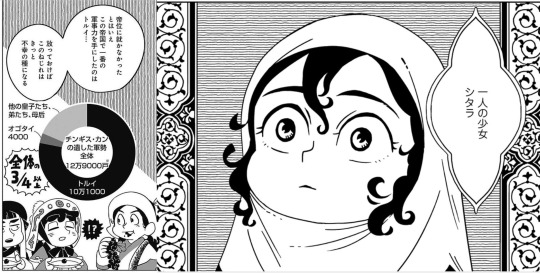
They put a lot of care into the visual language, such as the shape of text bubbles (right pic), so seeing charts like this (left pic) feels visually inconsistent.
Let's Talk Religion (Again)
Once again, I want to put the disclaimer that I am NOT a scholar, this is just what I know and my understanding so please don’t quote me. I probably have to gloss over and simplify a lot because there’s… too much.
At the beginning of the volume, there is mention of Islamic meat slaughtering practices (halal meat) compared to the customs of the Mongols.
I think halal is a word a lot of people have heard, especially in recent years, but what does it even mean?
Halal is anything that is permissible in Islam. Haram is anything NOT permissible in Islam, or sins. There are also things that are makrooh (strongly discouraged but not a sin) and mustahab (recommended but not obligatory) and so on.
How does that translate to food?
Halal foods are foods that are permissible for Muslims to consume. Most things are okay for consumption, so it's easier to list what isn't allowed/haram. You might be familiar with the fact that Muslims do not drink alcohol or eat pork. There's a reason for all this, but I'll get to that later. Some other things that are haram to consume are the following:
Carnivorous/predatory animals (Pigs are omnivores, so they technically fall into this category as well. Only herbivores are permissible to consume.)
Animals that died from disease.
Incests, reptiles, and "pests" (such as mice/rats).
These next points are debated depending on what scholar you follow:
Some Muslims only eat fish that have scales, while some believe pretty much any seafood that doesn't fall into the previous categories is fair game (I call this The Great Muslim Seafood Debate loll).
Some Muslims believe you should avoid eating "beasts of burden" such as horses/mules.
Exceptions to these rules are if you are in a situation where you are left with no other choice but a haram food option, then you will not be guilty of sin for consuming. God never wants to place unreasonable burden on his creation. One of the most important things in Islam is intention, and God can see what's in your heart.
Okay, so you have something that clears these rules. But! That doesn't automatically make it halal. When it comes to consuming animals, the slaughtering of the animal has to be done in a specific way. Let's break it down:
Land animals -
When slaughtering a land animal, it must be done in a specific way so that it becomes halal meat:
The animal must be well-fed and given water before slaughter.
They must be soothed and calm. You cannot slaughter if the animal is fearful and agitated.
Other animals must not witness the slaughter as it can frighten them.
The slaughter must be performed using a very sharp knife to cut the throat. Doing this will cause the animal to immediately lose consciousness and thus will not feel pain. It must be done as quickly, painlessly, and humanely as possible.
Do not allow the animal to see the knife as it can frighten them.
The slaughter must be performed by a Muslim. They must recite a prayer before cutting the throat and do so while facing Mecca.
The blood must be drained from the animal's body after the neck is cut as disease/toxins/etc. can live in the blood. This makes the meat cleaner and more sanitary.
You cannot stun an animal before slaughter (such as hitting it on the head or zapping it with electricity).
In cases where you are hunting, you can use arrows, guns, or hunting birds when hunting an animal that cannot easily be caught for traditional methods of slaughter.
Hunting is only allowed with the intention of hunting for food, not sport.
You must say a prayer when shooting.
If the animal does not die immediately during the hunt, you should slaughter them as quickly and painlessly as possible and not unnecessarily prolong any suffering.
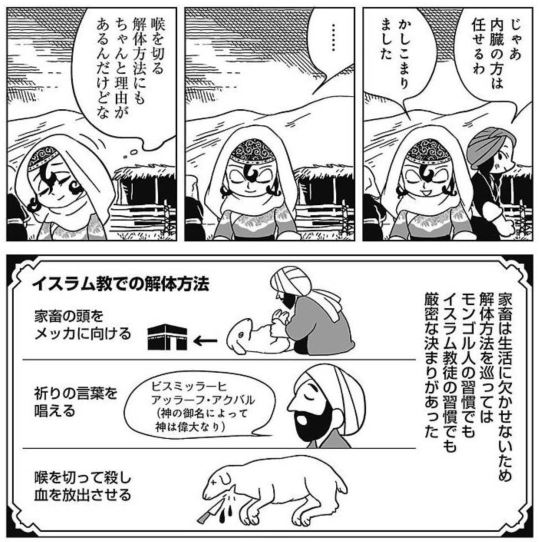
"There's a reason for cutting the neck and slaughtering this way, you know..."
Animals of the sea -
The animal must die outside of the water (for example, using "blast fishing" or "fish bombing" is prohibited — it's horrible for the environment and does not discriminate on what fish are killed. Even animals like dolphins and turtles can get caught in the blast and die. Coral reefs and such can end up damaged as well. Also, according to Wikipedia "For every ten fish killed, only one or two float to the surface, due to damage caused to their otherwise buoyant internal air bladders. The rest sink to the bottom." This causes a lot of waste. Using this method, you also wouldn't know if a fish was dead from disease and was already floating around or if it was from the blast.)
They should not be descaled/skinned while still alive (this is the same for land animals).
I know this might seem like a long and tedious list, but there is a reason for these halal food guidelines. The purpose is to not cause any unnecessary pain to animals, be as humane as possible, and not consume anything that would be bad for your health. Health is of the utmost importance in Islam. I think we can all agree that alcohol is not great for you. There are studies being done about the effects of consuming carnivorous animal meat, pork, and so on not being the greatest for you either, etc. Again I want to reiterate, I'm not judging anyone. You do you, I literally don't care. I'm not saying you're wrong and terrible for consuming these things.
But yeah, I think that's everything for relevant religious stuff that came up in this volume.
I'd like to use the setting of the series as a springboard to discuss something I never see anyone talk about, and I think we should.
The "Middle East" Is Actually a Colonizer Term
Before you roll your eyes at me, just hear me out.
A while back, Drew Mackie, the guy behind Thrilling Tales of Old Video Games where I work as a translator/consultant, sent me an email with some questions for a post he was working on. Long story short, he wasn't sure how to refer to these Nintendo characters who looked stereotypically "Middle Eastern".
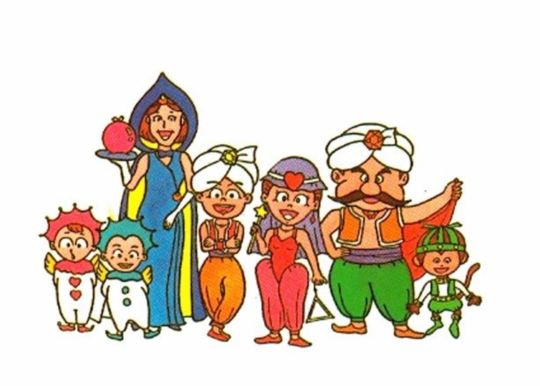
Big sigh... I am TIRED of seeing character designs like this... Check out Drew's post here! He writes lots of cool articles that are super interesting!
Luckily for him, this was VERY MUCH my lane. Please entertain my oncoming rant about the term "Middle East" guys. I swear I have a point to make.
When Drew sent me the picture of these Nintendo characters, I groaned. When I sent my brother the picture, he got real ticked off.
I don't know where it started exactly, but everyone just decided that this is what the "Middle-Eastern-look" is. To me, it just looks like Disney's Aladdin — in which what I mean is that this is what Westerners decided the whole region between the far East and far West looks like and everyone was like, "Yeah sure, okay." This look that is so prevalent looks like some bizarre mash-up of West Asia, South Asia, Central Asia, and North Africa to me. That's quite a range of regions to group together...
I always found it weird that this was the "Middle-Eastern-look" since it looked nothing like Kuwaiti traditional wear to me (or any other traditional clothing I'm familiar with tbh). And yet, it's like everyone was telling me, "Yes, this is what you wear. This is what you look like."

Some actual Kuwaiti traditional clothing. You can see a lot of influence from other regions due to trade. The headdresses remind me of the ones you see in Tenmaku no Jadoogar! Turkey has something similar as well! And idk about you guys, but it doesn't look like the aforementioned "Middle-Eastern-look". That is some unholy mishmash of "brown culture" from the perspective of those outside of said culture.
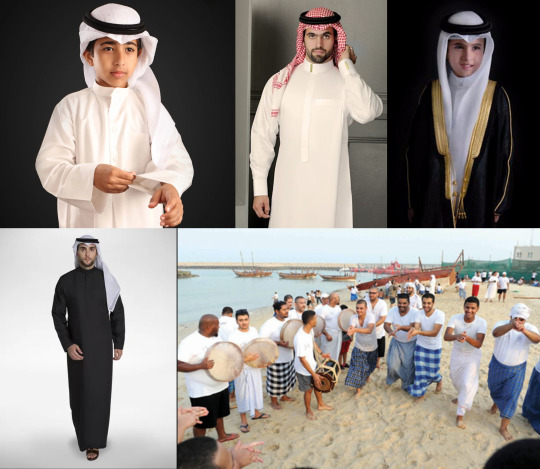
Bottom right pic is what ship builders and pearl divers wore. My grandpa was a pearl diver! The fabric tied around their waist that's different colors and patterns is called a wizar. Dishdasha (the men's robe) can come in various colors. White is worn in the summer and darker colors in the winter. The red qitra (the fabric on the head) is also for winter as it's thicker and warmer than the white one. You can mix and match, especially between seasons to suit you depending on the weather. The black and gold overcoat is a bisht and it's to dress up the dishdasha, usually for special occasions.
Honestly, I almost never use the term "Middle East" myself for a few reasons (and now that I think about it, most of my family and friends don't really either. Maybe that's just me and the people around me idk. I know some people from the region do use it but I'm talking about the people I personally know). Like, what does the term even mean? I mean, it's not a continent, but everyone seems to act like it's the eighth continent. I get that continents are usually further broken up into regions to help be more specific about similar groups since continents are, well, huge and cover a lot.
The problem is, the "Middle East" is wayyyy too big and broad, and it covers areas that often don't have as much in common as many would believe, and it spans multiple continents (Are there similarities? Yeah of course, but like...). It feels like they said, "All you guys talk Arabic so we'll group you. Oh, and throw Iran and Turkey in there because same thing, right?" But then what about Libya or Morroco, which are North African Arab countries? By some definitions, they're not considered to be in the Middle East even though they "fit" but Egypt, another North African Arab country is? I could go on, but idk it all seems very arbitrary.
Yes, these regions did have a lot of trade going on with the Silk Road so you'll see common things shared across various countries along this trade route, but many people have just mashed them together and decided it's all the same.
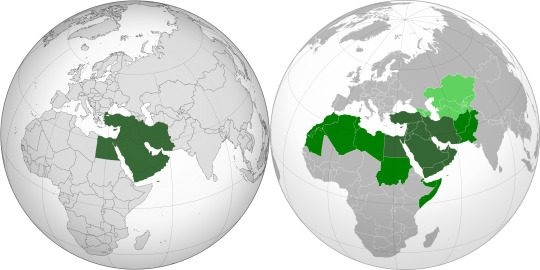
Which Middle East is the Middle East-est Middle East?
Where did the term come from? -
The term "Middle East" may have originated in the 1850s in the British India Office. However, it became more widely known when American naval strategist Alfred Thayer Mahan used the term in 1902 to "designate the area between Arabia and India".
Which reads to me like, because some colonizers said so.
There's also a term that's worse I learned about called the "Greater Middle East" which Wikipedia describes as:
The Greater Middle East is a political term, introduced in March 2004 in a paper by the Carnegie Endowment for International Peace as a part of the U.S. administration's preparatory work for the Group of Eight summit of June 2004, denoting a vaguely defined region called the "Arab world" together with Afghanistan, Iran, Israel, Turkey, and several other neighboring countries that have cultural ties.
I recommend reading the rest of the paragraph on Wikipedia for yourself. It comes off as incredibly nope. It's gross.
But even this description says, "denoting a vaguely defined region" which is what I mean when I say it's arbitrary. I feel like it's too often used as a blanket term with negative connotations.
Personally, if I'm talking about Arab countries, I say "Arab" but it also depends on what I'm talking about. If it's a shared Arab thing, then Arab is fine, but if it's a cultural thing that's unique to Sham Arabs for example, I don't use it as broadly. Arab countries vary A LOT. Many assume they're all the same, but truth be told, Arabs get culture shock from each other and have a lot that's different — including neighboring nations. Sometimes we don't even understand each other because of how different dialects can be across different regions.
Obviously, I don't expect everyone to know all this, but I think the way we divide up the region and how we refer to it could get a makeover.
The world seems to be okay with dividing up, for example, Europe into smaller sub-regions that make some kind of sense — like Northern Europe, Western Europe, etc. But we don't commonly do that for the "Middle East" — nothing that makes any kind of sense. "Middle East" because it's halfway to East Asia in relation to the West? Because the colonizers said so?
Personally, I generally refer to myself as West Asian and I always check "Asian" on forms, even when they try to convince me Arabs are apparently white as if that makes sense (meanwhile my dad is perceived as being mixed race/black in the U.S. and he's not even close to being the darkest on his side of the family. While I am pale, no one would perceive me as white). Like I mentioned in my volume one post, I'm not only Kuwaiti Arab, I'm also Irani which is Persian/Turkmen and NOT Arab, plus some Turkish ancestry (also NOT Arab). Allllll of those countries are in West Asia. West Asia is already a term! Why don't we use it?????? We should all know why by now if you've gotten this far in the post.
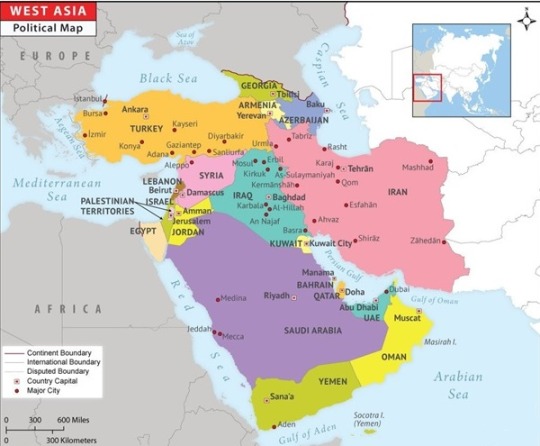
Map of West Asia, which is already a thing. An actual geographical term. Wow. Too many people don't realize these countries are indeed in Asia. Crazy how Asia isn't just Japan, China, and Korea, huh.
I'm sure there are "Middle Easterners" who don't care, and I'm not here to tell those people how they should identify. That's up to them. DO NOT tell people how they should identify because that is deeply personal, and who the hell are you to tell them who they are?
But for the rest of you, consider adopting less colonizer vocabulary maybe? A lot of my family and friends find the term to have racist connotations since it's almost always used in a not-so-great context and it's from the view of the West. We HAVE other terms that we can use! Time to brush up on our geography and unlearn some nonsense kids.
I'm done. Thanks for coming to my TED talk❤️
✨And once again✨

I await your email publishers, my resume is ready… [email protected]
🧿🪬🧿🪬🧿🪬🧿🪬🧿🪬🧿🪬🧿🪬🧿🪬🧿
—————————–
If there’s any Japanese-only manga you want me to check out, let me know! No promises, I’ll only read what I’m interested in, but I’ll take suggestions into consideration. Preferably, shorter manga or newer manga with a few volumes out since I like to take breaks from longer series I’m reading :)
#tenmaku no jadoogar#a witch's life in mongol#manga#manga recs#manga recommendations#shoujosei#josei manga#manga discussion#kono manga ga sugoi#漫画#おすすめ#天幕のジャードゥーガル
33 notes
·
View notes
Text
Please avoid abbreviating.
Don’t write SWT, SAW or PBUH.
Write ﷻ and ﷺ or “SallAllahu Alayhi Wa Sallam”.
Scholars said it is Haram to abbreviate Durud. Don’t deprive yourself of the blessings.
The use of abbreviation of Durud and Salam i.e. SAW, PBUH, RA, A.S. etc. of writing the Salawat incorrectly has become the normal in todays day and age where social media has become the resource of learning the Deen.
Imam an-Nawawi رحمه الله the great Muhadith, states:
“It is praiseworthy (mustahab) for a person writing Hadith that at the mentioning of the Messenger of Allah (ﷺ), he writes “SallAllahu Alayhi Wa Sallam” in full and not merely using abbreviations, and neither sufficing on one of the two, i.e. Salat & Salam.”
[Sharh Sahih Muslim, 1/39]
Shaykh al-Islam Imam Jalal ad-Din al-Suyuti رحمه الله said:
“The person who first introduced the practice of using abbreviation for Durud had his hands cut off.”
The conclusion is that it is not permissible and the one who indulges in this act is stripped from a very great benefit (Khayr) and has lost a great reward.
7 notes
·
View notes
Text

Q. When and how is Qunoot-e-Naazilah recited and what is its ruling?
A. Qunoot-e-Naazilah is recited whenever the Muslim Ummah is faced with a major catastrophe or crisis.
Qunoot-e-Naazilah is recited in the second Rakaat of the Fajr Salaah after rising from Ruku’ into the standing (Qaumah) posture and before going into prostration (Sajdah) whilst keeping the hands one’s sides.
In a congregation, the Imaam will recite the Qunoot-e-Naazilah aloud and the followers (Muqtadi’s) should say ‘Ameen’ softly at the end of each Dua recited of the Qunoot-e-Naazilah.
Qunoot-e-Naazilah may also be recited softly by women performing Fajr Salaah at home or by any person performing Fajr Salaah individually.
It is preferable (Mustahab) to recite Qunoot-e-Naazilah as frequently as possible until such a catastrophe or crisis facing the Muslim Ummah settles or subsides.
Sayyiduna Ansa Bin Maalik Radhiyallahu Anhu reports that “Rasoolullah Sallallahu Alayhi Wasallam recited Qunut for a month in the Fajr Salaah after Ruku’ and invoked curse upon Bani Usayya.” (Muslim)
The Qunoot-e-Naazilah is as follows:
اللَّهُمَّ اهْدِنِي فِيمَنْ هَدَيْتَ، وَعَافِنِي فِيمَنْ عَافَيْتَ، وَتَوَلَّنِي فِيمَنْ تَوَلَّيْتَ، وَبَارِكْ لِي فِيمَا أَعْطَيْتَ، وَقِنِي شَرَّ مَا قَضَيْتَ، فَإِنَّكَ تَقْضِي وَلاَ يُقْضَى عَلَيْكَ، وَإِنَّهُ لاَ يَذِلُّ مَنْ وَالَيْتَ، تَبَارَكْتَ رَبَّنَا وَتَعَالَيْتَ
اللَّهُمَّ اغْفِرْ لِلْمُؤْمِنِينَ وَالْمُؤْمِنَاتِ وَالْمُسْلِمِينَ وَالْمُسْلِمَاتِ، وَأَلِّفْ بَيْنَ قُلُوبِهِمْ، وَأَصْلِحْ ذَاتَ بَيْنِهِمْ، وَانْصُرْهُمْ عَلَى عَدُوِّك وَعَدُوِّهِمْ. اللَّهُمَّ الْعَنْ كَفَرَةَ الْكِتَابِ الَّذِينَ يُكَذِّبُونَ رُسُلَك وَيُقَاتِلُونَ أَوْلِيَاءَك. اللَّهُمَّ خَالِفْ بَيْنَ كَلِمَتِهِمْ، وَزَلْزِلْ أَقْدَامَهُمْ، وَأَنْزِلْ عَلَيْهِمْ بَأْسَك الَّذِي لَا يُرَدُّ عَنْ الْقَوْمِ الْمُجْرِمِينَ
“O Allah guide me among those You have guided, pardon me among those You have pardoned, befriend me among those You have befriended, bless me in what You have granted, and save me from the evil that You have decreed. Indeed! You decree, and none can pass decree upon You. Indeed! he is not humiliated whom You have befriended, blessed are You our Lord and Exalted.
O Allah, forgive us and the believing men and women and Muslim men and women, unite their hearts with mutual love, set right their mutual affairs and help them against theirs and Your enemy. O Allah, let Your curse be on those disbelievers who reject Your prophets and kill Your chosen ones. O Allah, make difficult their plans, shake their feet and give them such punishment which is not turned away from a sinning people.” (Tirmidhi Shaami 2/6)
It is also permissible to add appropriate Dua’s to the Qunoot-e-Naazilah in Salaah in Arabic that are applicable to a particular circumstance which gives more meaning, effect and relevance to one’s Dua, for e.g. making Dua for the help and assistance of the Muslims in Palestine, Syria, Bangladesh, Kashmir, India and for the Muslims suffering all over the world. (Badaaius-Sanaai’1/273 – Fataawa Mahmoodiyyah 7/171 – Fataawa Raheemiyyah 6/23 – Jawaahirul Fiqh 6/81 –)
Allah Ta’ala Knows Best
#islam#quran#islamic#muslim#islamicquotes#pakistan#islamic group#muslim community#muslim countries#istanbul#witar dua#Qunoot-e-Naazilah#prophetmuhammad#allahuakbar#prayer#arabic dua
2 notes
·
View notes
Text

🍃🕊🍃 Imam al-Jawad (as):
“Dependence and Independence People will be dependent on the one who, by relying on Allah, considers himself independent. And the pious will naturally be favored by people even if they aren't pious themselves.”
al-'Allama al-Majlisi
📚 Bihar al-anwar 📚
(vol. 75, p. 79)
❁┈┈•⊰✿🤎✿⊱•┈┈❁
🍃🕊🍃 Imam al-Jawad (as):
“Learning Strive in gaining knowledge and wisdom, and know that learning is obligatory (Wajib) and discussing (what has been learned) is recommended (Mustahab).”
al-'Allama al-Majlisi
📚 Bihar al-anwar 📚
(vol. 75, p. 80)
❁┈┈•⊰✿🤎✿⊱•┈┈❁
🍃🕊🍃 Imam al-Jawad (as):
“Knowledge Knowledge is the means of helping friends and relatives, the reason for and sign of fairness, a gift and means of entertainment in gatherings, the human's companion in travel, and one's mate in lonely times.”
al-'Allama al-Majlisi
📚 Bihar al-anwar 📚
(vol. 75, p. 80)
❁┈┈•⊰✿🤎✿⊱•┈┈❁
.
0 notes
Text
Question - Can Daily Nafila (Mustahab) prayers be performed while sitting instead of standing?
•••●•✾ ﷽ ✾•●••• Question Can Daily Nafila (Mustahab) prayers be performed while sitting instead of standing, even when a person can perform them while standing?AnswerNafila prayers can be performed in a sitting position even if one does so voluntarily, and if someone performs these prayers in a sitting position, it is not necessary to count to units as one rakah. However, it is better to perform…
0 notes
Note
is it true that shias curse people
This is true, the concept is called tabarra (dissociation) and is one of the articles of fatih in 12er Shi'ism. It is obligatory for a Shi'a to distance/dissociate themselves from anyone who express hatred towards the Prophet (pbuh&hf) and his Household (a). A person who express such hatred is called a Nasibi (detester) and are ritually impure. It is mustahab (recommended) to send La'an, an invocation, asking God "to remove His mercy" from such people. Sending La'an extends even to tyrants and oppressors.
39 notes
·
View notes
Text
The Muslim’s attitude:
* When the Muslim hears a Command from Allaah and His Messenger صلى الله عليه وسلم, then he should carry it out without hesitation to the best of his ability.
* When the Muslim hears about a prohibition, then he should shun it without having any second thoughts.
* Don’t wait asking if it is Waajib or Mustahab or if it is Makrooh or Haraam.
Shaikh Muhammad ibn Saaleh al-`Uthaimeen رحمه الله said:
“Second point: Obeying his صلى الله عليه وسلم command and not hesitating in carrying it out due to the saying of Allaah تعالى:
{It is not for a Believer, man or woman, when Allaah and His Messenger have decreed a matter that they should have any option in their decision. And whoever disobeys Allaah and His Messenger, he has indeed strayed in a plain error.} [Surah al-Ahzaab (33): 36]
That is why I say: That which is an error is that some people whenever a command comes to him from Allaah and His Messenger, he begins to inquire about it. So he says: “Is this command Waajib (obligatory) or is it Mustahab (recommended)?” as many people say today. This is a question which must be thrown out and not asked because the Sahaabah (Companions of the Messenger) رضي الله عنهم whenever the Prophet صلى الله عليه وسلم commanded them with something, they never said: “O Messenger of Allaah! Is this command Waajib or is it Mustahab or other than that?” Rather they acted and had conviction without even asking.
Thus we say: Do not question. Rather upon you is to act. If you bear witness that Muhammad is the Messenger of Allaah then do that which he has commanded you to do.
However in a situation where a person has fallen into an issue and an act of disobedience, then in this case he has the right to ask: “Is this obligatory or non-obligatory?” That's because if it was obligatory then he must repent from it because he has disobeyed. And if it was not obligatory then his affair is easy.”
[Explanation of 40 Hadeeth of al-Nawawee, Hadeeth #2]
16 notes
·
View notes
Text
Understanding the Significance of Fasting Days in Islam
Fasting is an essential part of the Islamic faith, with numerous days throughout the year set aside for this important practice. For Muslims, fasting is not just about abstaining from food and drink but also about strengthening their relationship with God, developing self-discipline, and gaining empathy for those in need. The fasting days in Islam carry deep spiritual and physical significance, allowing Muslims to purify their hearts and souls.
The Obligatory Fasting of Ramadan
The most well-known and significant fasting period in Islam is during the month of Ramadan. Ramadan is the ninth month of the Islamic lunar calendar, and during this month, Muslims fast from dawn until sunset. This fast includes abstaining from food, drink, and other physical needs, such as smoking or marital relations, during daylight hours.
Ramadan is a time of intense reflection, prayer, and community. Muslims believe that the Quran was revealed during this month, making it especially sacred. The fast serves as an opportunity for spiritual renewal, allowing individuals to focus on their faith and cultivate a stronger relationship with God. The nightly Taraweeh prayers are held during Ramadan, and Muslims often engage in increased charity, helping those who are less fortunate.
The fast during Ramadan is obligatory for all adult Muslims, though there are exemptions. Children, the elderly, pregnant or nursing women, travelers, and those who are ill are typically exempt from fasting but can make up the fast at a later date when they are able. Ramadan lasts for 29 or 30 days, depending on the sighting of the moon, and culminates in the celebration of Eid al-Fitr, a festival of joy and gratitude.
The Voluntary Fasting Days
In addition to Ramadan, there are several other days throughout the year when fasting is highly recommended or considered voluntary. These fasting days in Islam are an excellent way for Muslims to seek additional rewards and blessings.
Fasting on Mondays and Thursdays: The Prophet Muhammad (peace be upon him) was known to fast on Mondays and Thursdays. These fasts are not obligatory but are highly encouraged. They serve as an opportunity for Muslims to gain additional spiritual rewards, as it is believed that good deeds are presented to God on these days.
The White Days (Ayyam al-Beedh): These are the 13th, 14th, and 15th days of each Islamic month. Fasting on these days is a Sunnah, meaning it is a recommended practice but not an obligation. It is believed that fasting on these days brings special rewards and helps purify the soul.
The Day of Arafah: This is one of the most significant days in the Islamic calendar, falling on the 9th day of the Islamic month of Dhu al-Hijjah. It is the day when millions of Muslims gather at the plain of Arafah in Saudi Arabia for the annual Hajj pilgrimage. For those who are not performing Hajj, fasting on this day is highly recommended. It is believed that fasting on the Day of Arafah can expiate sins of the previous year and the coming year.
The Day of Ashura: Falling on the 10th of Muharram, Ashura is another important day of fasting. It commemorates several historical events in Islam, including the rescue of the Prophet Musa (Moses) and his followers from Pharaoh. It is also the day when the grandson of the Prophet Muhammad, Imam Hussein, was martyred in Karbala. Fasting on Ashura is a way of remembering these events and seeking blessings from God.
The Six Days of Shawwal: After Ramadan, Muslims are encouraged to fast six additional days during the month of Shawwal, the month that follows Ramadan. Fasting these six days, along with the Ramadan fast, is believed to bring the reward of fasting for an entire year. These fasts can be completed at any time during the month, and they provide an opportunity to maintain the spiritual benefits gained during Ramadan.
The Spiritual and Physical Benefits of Fasting
Fasting is not only a way to fulfill a religious obligation but also a practice with numerous benefits. Spiritually, fasting helps Muslims grow closer to God by creating a sense of dependence on Him. It encourages self-reflection, humility, and gratitude for the blessings one has in life.
Fasting also provides a way to develop self-discipline. By refraining from basic desires such as eating and drinking, Muslims learn to control their impulses and redirect their focus towards higher goals, such as charity, worship, and personal growth.
Physically, fasting allows the body to rest and detoxify. Although fasting may seem challenging, many find it to be a rejuvenating experience that provides clarity and a sense of calm. It is a chance to reset one’s habits, eat mindfully, and focus on what truly matters.
The Importance of Learning About Fasting
Understanding the true meaning of fasting and its significance in Islam can help Muslims gain a deeper appreciation for this practice. Learning about the spiritual and historical background of fasting days in Islam can strengthen one’s connection to the faith. Websites like Shaykhi offer valuable resources for those interested in learning more about Islamic practices, including fasting and the Arabic language. Whether you're seeking knowledge about Quranic teachings, the intricacies of fasting, or guidance on how to deepen your understanding of Islam, Shaykhi provides a rich platform for your learning journey.
Conclusion
Fasting is much more than just a physical act in Islam; it is a deeply spiritual practice that allows Muslims to strengthen their faith and relationship with God. From the obligatory fasting during Ramadan to the voluntary fasts on significant days like Arafah and Ashura, each fasting day in Islam serves as an opportunity for spiritual growth, self-discipline, and connection to the community. By fasting with sincerity and understanding, Muslims can cultivate empathy, gratitude, and mindfulness, making it an essential practice for Muslims seeking closeness to God.
0 notes